Interview with Diana E. Wheeler
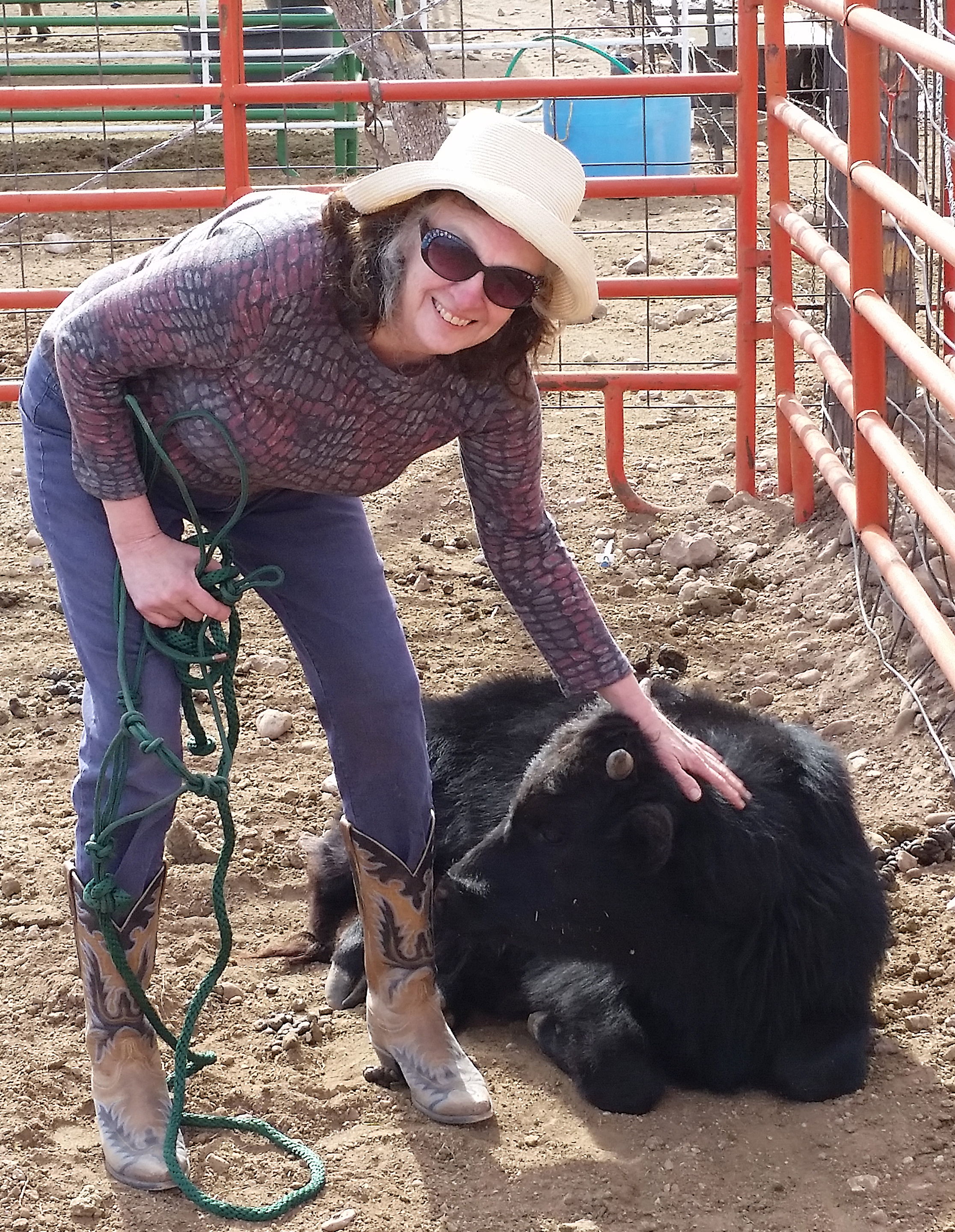
Diana at local ranch with a miniature cow © Diana E. Wheeler
The research of Diana Esther Wheeler from the University of Arizona entomology department focuses on the physiological basis of caste differentiation in social insects. She has mainly worked on the ant genera Cephalotes and Pheidole and is the author of ground-breaking papers on caste polymorphism, endocrinology, reproduction, and molecular mechanisms of caste determination. In this interview, we talk about her work and her career.
An Interview compiled by Alice Laciny 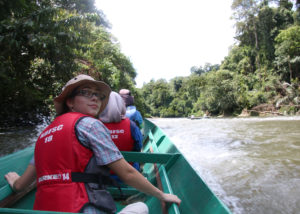
MNB: We always start off with a quick introduction – so please tell us a bit about who you are, where you work, and what you work as.
DEW: I’m Diana Wheeler, I’m a professor at the University of Arizona, in the entomology department. I have worked on social insects as interesting physiological models that I believe inform about their evolution, and it’s also given me ideas about experiments to do on other, non-social insects.
MNB: And what’s your current research like?
DEW: I’m actually quite close to retirement. My last student wanted to look at the microbiome and the nutritional ecology of Cephalotes ants, which are unusual among ants in terms of their extracellular gut microbiome. Until the age of being able to sequence the bacteria to the point of guessing who they were and what they were doing, we really couldn’t make much progress. Over the tenure of his PhD, we went from having no molecular tools at all to an overwhelming number of tools involved to study that. And so we’re still working on writing that up.
MNB: Sounds very interesting! And what was your beginning like? How did you start studying ants?
DEW: In my cohort of people growing up, people who got interested in biology were interested – through Jacques Cousteau – in the ocean. Many people in my age group got started by wanting to be marine biologists. So, I wanted to be a marine biologist and actually got a master’s in marine biology, working on crab larvae in estuaries, how they manage to stay in there without getting swept out. Then I spent two research seasons working on that as a PhD, and it was just too hard. So much labour involved in keeping things in the lab in water, raising their food … So, I happened to take a course called “entomology”, although I was not in a school that had an agriculture or entomology department, and it was just really life changing and eye opening to go “Wow! They are so diverse and so amazing!”
MNB: And you don’t have to keep them in water! So, were there any particular people who inspired you to pursue a career in myrmecology?
DEW: Actually, it was my advisor. He is an insect physiologist, his name is Fred Nijhout, and he is at Duke University. He came out of Carroll Williams’ lab at Harvard, where juvenile hormone was discovered. It was the grand age of insect endocrinology. While Fred was there, he talked to E.O. Wilson and became aware that, although ants were very interesting developmentally, almost nothing was known about their developmental endocrinology. So I got interested in the Pheidole ants in that question and actually started switching topics mid-stream, which was kind of hard when you’re in graduate school. I came up with about eight topics I thought were potentially bombproof; so if your first idea didn’t work, you had at least two or three other options. But I kept coming back to the ants – and it was successful.
MNB: Yes, as we can see! And if you compare where you are now with the beginning of your career, what inspires you now, what kept you going?
DEW: Social insects are just so cool physiologically and behaviourally! Particularly the ants and bees divide up the physiological functions so that they end up having very amplified reproduction and very cut-back reproduction. They develop these extremes that you don’t find anywhere else. I just found that fascinating! The sperm storage fascinated me, and the storage proteins. That’s what enables claustral foundation by ant queens. Even though they may sound boring, storage proteins are just amazing in the way they can be used to expand options in life history strategies.
MNB: So apparently, you are still fascinated by that to this day! And if you compare the world of entomology, myrmecology, or science in general when you started out with what it’s like now, what are the main differences for you?
DEW: The main differences are in the techniques. I actually just went to visit Fred Nijhout at Duke for his 70th birthday. I was his second student. (…) But endocrinology was really stuck by a couple of issues. Nobody could figure out how juvenile hormone worked – we’re still pretty rudimentary on that. And these questions about the microbiomes and the sperm storage were all just kind of stuck in places that you really didn’t have the tools to explore. So then the age of molecular biology broke loose, and now we have the tools to explore deeper and deeper into how these things work. So that’s different! The development of new techniques and analyses in molecular biology and bioinformatics was really rapid in the past decade! But I also think people always have to keep an eye on the organism and – for social insects – on the higher end, how it functions on a colony level. And then you can really think about evolution.
MNB: Yes, sure. And if you had had to pick a different career than being a myrmecologist, what would have been your backup plan?
DEW: It would have been something as a biologist that involved fieldwork. It doesn’t sound like my work involves a lot of fieldwork, but having ants as your organism you have to spend some time in the field collecting them because you can’t order them from a store. And the first ten years in Arizona, I spent a lot of time in the field, bringing as many ants as I could into the lab, to see which ones I could study. There’s nothing like spending time in the field. I love assessing diversity, so maybe something more ecological. But I would probably have ended up as a biologist, I think. And as a student – with my father also being a professor – I didn’t realize that there were a lot of careers in biology outside of academia. In retrospect, I’m not sure I would have made any different decision, but it would have given me more options to consider.
MNB: I see. And were there any obstacles you had to overcome during your career, any difficulties you had to face?
DEW: Probably, but I think I was oblivious to them. I would read that there were no opportunities for women, and I would say “Well, that can’t be right!”, so I just ignored it. I think that’s what women did for a long time. People are now rediscovering them in all kinds of fields. They just ignored it and kept doing it, even if they didn’t get paid. I was very lucky that opportunities really were opening for women. When I was an undergraduate, Yale was admitting women for the first time, so women were looked at in a different way than they had been before. So, I just worked really hard and didn’t let anything deviate from my goal.

A few people have asked me to comment on the significance of this picture. It was taken in July 1953 shortly before I turned 4 years old. The man is my grandfather, George C. Wheeler, who was a biologist at the University of North Dakota. He was a student of William Morton Wheeler, and like WMW, studied ants. We think the picture was taken in the Badlands, and George is showing me how to collect ants (note the aspirator). The film was found, undeveloped!, in the early 1980’s. By that time I was studying ants also. It was quite a surprise to see what developed, since none of us remembered my early exposure to ant field work. © Diana E. Wheeler
MNB: That’s great, and obviously it worked! And was there any moment during your career that scared or irritated you?
DEW: Well, it was really scary when you were finished, wondering if you would get a post-doc. Now post-docs go on longer, and there seem to be more opportunities for people to write them into their grants now. But I remember it feeling like walking to a precipice, thinking you’re going to fall into the abyss. So that was pretty stressful.
MNB: I absolutely get that! And if you had to choose your one favourite thing about ant research, what would that be?
DEW: Other than being in the field, I really love pulling things together from a lot of different directions and looking at them until they start to fit into the picture. The synthesis that can really move the field forward. That’s really satisfying!
MNB: Absolutely! And is there one thing you wish everybody knew about ants?
DEW: I wish that people would realize that little ants don’t grow up to be big ants! They’re all adults!
MNB: Oh yes, thank you, that always bugs me, too! So, do you have a favourite ant?
DEW: Pheidole is really dear to my heart. It got me started, and it’s come back. Ehab Abouheif has continued working on them and we’ve been collaborating on some things, like the recent paper in Myrmecological News, a historical look at some of the Pheidole research. He does work in the lab and in the field, so I get to watch through him how these new tools are being applied to the same questions I was asking before. My other favourite ant would be Cephalotes. After I finished at Duke, I went to Panama and I wanted to study Cephalotes ants because they had wonderful polymorphic worker systems. They also have all this other bizarre stuff about them – in terms of morphology and physiology, like the microbiome. So my interest in them, which brought my student to the microbiome, came from those experiences in Panama. They’re great and so cute!
MNB: I’ve seen them, they really are cute! And if you have any suggestions for myrmecology-newbies, what would those be?
DEW: Don’t get over-focussed too soon! Learn more about the diversity of ants. I’m a real fan of side-projects. Ants are always presenting new, interesting ideas, so keep other ants in the lab, watch them and know your group in a wide way, as much as you can!
MNB: That’s good advice! And what advice would you give yourself, as a young grad student? What would you have done differently?
DEW: Party more! I worked a little too hard sometimes, I think.
MNB: Also good advice, especially for people in grad school!

Diana at the top of Table Mountain in South Africa © Diana E. Wheeler
MNB: Is there any question you always get asked when people hear that you work with ants?
DEW: It used to be “Oh, ants? Come over to my house, I’ve got lots of them!” But now, with Ed Wilson having spent so many years teaching people about ants, people are a little more sophisticated about them. So you may find someone who is phobic or someone who finds them really interesting and might have a question, you never know.
MNB: What we often get is “I have ants in my kitchen or in my garden, how do I get rid of them?” – any advice on that?
DEW: Right, that’s hard! For some kinds of ants, there are actually good solutions. For fire ants, there is a bait called AMDRO you can put down. I tell people to try to figure out where they are coming from and block their entrances. And if all else fails, sometimes you just have to spray at a level that controls your infestation. For in the yard, I try to see if they are really a problem. The biggest problem would be the local leafcutter ants eating people’s plants. You can put sticky bait around the trunk of a tree, but sometimes you have to spray them out if you are really invested in having a garden. But I try to convince people to try to live with them before they do anything drastic.
MNB: Now for some really short questions. What’s the book on your bedside table or the last book you read?
DEW: “Pachinko”, a historical novel about Korea from the 1920s until today, with really neat characters! The last biology book I read was a biography of Humboldt – he was just so amazing and ahead of his time, talk about a crazy man! And also “The evolution of beauty”, a different take on sexual selection.
MNB: Watching sports or doing sports?
DEW: Watching.
MNB: Evening or morning?
DEW: Evening.
MNB: Tea or coffee?
DEW: Coffee.
MNB: Sugar or sweetener?
DEW: I don’t put anything in the coffee. If I did, I would put sugar and not any of those weird things.
MNB: Aspirator or forceps?
DEW: You need both.
MNB: Nest densities or pitfall traps?
DEW: Pitfall traps – you pick up a lot of stuff you wouldn’t see otherwise.
MNB: Field or lab?
DEW: Field.
MNB: Pin or ethanol?
DEW: Pin to identify them, and have backup in ethanol.
MNB: Paper reprint or pdf?
DEW: I’m transitioning. If I’m reviewing something really carefully, I go with paper. Otherwise pdf.
MNB: Kin selection or group selection?
DEW: Group selection.
MNB: Monodomy or supercoloniality?
DEW: Monodomy.
MNB: Worker or queen?
DEW: Worker.
MNB: And that’s it! Thanks so much, it was really nice chatting with you!


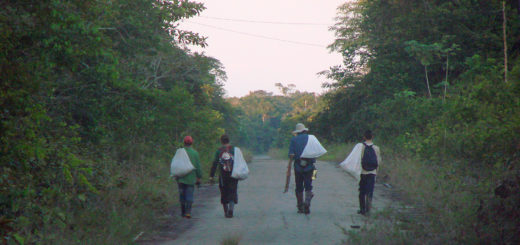
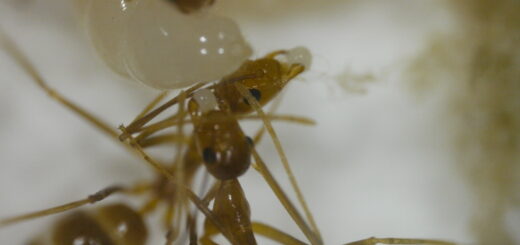
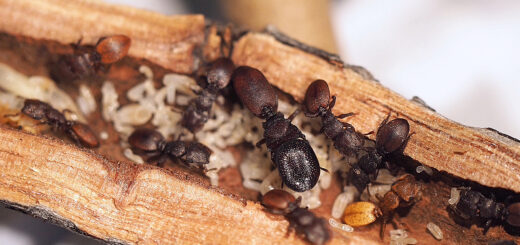
Recent Comments